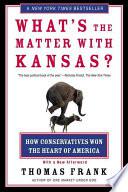Quotes from book
What's the Matter with Kansas?

What's the Matter with Kansas? How Conservatives Won the Heart of America is a book by American journalist and historian Thomas Frank, which explores the rise of populist anti-elitist conservatism in the United States, centering on the experience of Kansas, Frank's native state. In the late 19th century, says Frank, Kansas was known as a hotbed of the left-wing Populist movement, but in recent decades, it has become overwhelmingly conservative. The book was published in Britain and Australia as What's the Matter with America?

meaning any talk about the failures of free-market capitalism — and then, seconds later, hear them rail against the "media elite" or the haughty, Volvo driving "eastern establishment."
Part II: The Fury Which Passeth All Understanding, Chapter Six: Persecuted, Powerless, and Blind (pp. 113-114).
What's the Matter with Kansas? (2004)